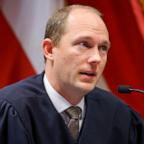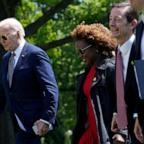The Hinkie Chronicles' latest chapter
— -- Sam Hinkie, the Sixers' besieged general manager, wonders how the past six weeks might have unfolded had Kendall Marshall been healthy -- whether Philly would have won more games, stayed off TMZ and avoided a shocking, league-brokered internal shake-up.
Marshall's four-year, $8 million deal in September -- partially guaranteed, of course -- is an NBA footnote, but for Hinkie, it represented the path to normalcy. During the signing process, Philly's experts concluded Marshall -- who was recovering from a torn ACL -- could be available for opening night, Hinkie says. Instead, he's making his debut tonight for a 1-22 laughingstock.
"We predicted it wrong," Hinkie says. "That's my fault. I've made plenty of mistakes, and I'm sure I'll make more."
Marshall could have provided two things the howling critics rightfully suggest the Sixers need: a competent point guard, and some sort of veteran mentor for Jahlil Okafor, their wayward rookie star. "This has been hard," Hinkie says. "We haven't been proud of this kind of start. We had strong desires for a point guard who could help us play at a high tempo, and get our best players the ball in positions where they could be successful. We want someone to throw a post entry pass. We thought Kendall was that guy."
Marshall, 24, is young by NBA standards, but not by Philly standards. "He's been around the block. Our guys look up to him. They remember him at North Carolina. I told him, 'On this team, people are going to look up to you, and model their behavior after you.' "
That includes off-court behavior. "You know how to manage your sleep," Hinkie recalls telling Marshall. "You know when to say, 'Guys, it's time to go home.' "
That sounds like too much responsibility for someone so young, and Hinkie knows it. "Can he mentor as well as a veteran? Maybe not. We miss Jason Richardson. For sure, you look back on things now, and you wish you would have had someone who could have helped us right the ship during this injury situation."
It has been Hinkie's choice to steer away from quality, young-ish veteran free agents who would cost real money and help win games -- Cory Joseph types. He has tried instead to churn the bottom of the roster for minimum-salaried players who might become super-cheap, and super-tradable, contributors. "We could have chosen safer options," Hinkie says. "Many in the world would have us choose safer options -- keep this player, instead of taking a gamble on a player whose name you don't know. But when that player becomes Robert Covington, people are excited. We've chosen that sort of thing very often."
That has come at a cost, and Hinkie admits the cost might be higher than he figured. "Is there a better balance we could strike with our roster? There may very well be."
There is some dissonance in listening to Hinkie admit that, and then (justifiably) point out that instead of spending money on free agents, he used his cap space to snag draft picks from the Kings -- the kind of move that will become harder to engineer now that everyone will have cap room. What, exactly, is the right balance?
That's one change you can expect under new chairman of basketball operations Jerry Colangelo, and possibly before Christmas. The Sixers are going to sign another veteran to guide the flock. Keep an eye on Elton Brand. It's too early to say whether Colangelo's hiring on Monday will bring upheaval to Philly's decision-making, or its long-term commitment to "The Process." As Ken Berger of CBS Sports reported, lots of executives from other teams are already assuming Colangelo, a famously opinionated basketball legend, has supplanted Hinkie in the decision-making chain -- to the point that Hinkie might be perceived as a lame duck.
Hinkie has no plans to step down and he remains confident in his power. "Our owners made it very clear they want me leading us long term," Hinkie says. "Adding one more voice will make the conversation richer. Might it be challenging at times? I'm sure it will be. But making big decisions shouldn't be easy -- it shouldn't be that you have an idea, and you get to execute it without anyone questioning it."
Despite reports to the contrary, every move in the Hinkie era has been the product of vigorous internal debate. Hinkie had to sell the ownership group, led by Josh Harris, hard on dealing Michael Carter-Williams for a lightly protected pick from the Lakers, sources say. People inside the organization aren't sure how Colangelo's presence will change that process, other than the obvious addition of a loud and respected voice. Harris has always been the hammer. It may be that if Colangelo and Hinkie clash, the winner will be the one who persuades Harris. It also may turn out that Harris develops a rapport with Colangelo, and Hinkie winds up ostracized -- and eventually fired, in favor of Colangelo's son, Bryan, the former GM of the Raptors and Suns.
Hinkie feels no need to apologize for the organizational teardown he spearheaded upon taking the job in spring 2013. Harris and his partners were on board with the plan before Hinkie walked in the door for his first interview. The Sixers had just lived through the hell of the Andrew Bynum trade, and they owed two future lottery-protected first-round picks -- meaning they had incentive to plunge into the lottery, and keep those picks.
There was a shared desire between Hinkie and Harris to pursue championships, and they had both studied NBA history enough to know how most title teams had been built. "I suggested that if you really want to build a team that competes deep in May and June, then you have to ask: How have other teams like that been built?" Hinkie recalls of his getting-to-know time with Harris. "What are the key components? How many do you have? If you don't have them, how could you get them?"
The Sixers reached out last summer to Kawhi Leonard and Jimmy Butler, league sources have said, and they got nowhere. That failure is pertinent, Hinkie insists. "They chose to stay with the teams that drafted them."
Translation: You need stars to win a title, and the best way to get a star over his entire prime is to draft him. "The most challenging part is to go from zero stars to one," he says. "After the Clippers got Blake Griffin, Chris Paul is a possibility. After the Rockets had James Harden, Dwight Howard is a possibility. After the Cavaliers have Kyrie Irving, LeBron [James] coming back is a possibility."
The Process has never been all that complicated, and Hinkie points again to the Bynum/Howard mega-trade as evidence that it might not be all that unusual. That deal kicked off Orlando's post-Howard rebuild, and thanks to that trade, they started it with Nikola Vucevic, Arron Afflalo, and extra draft picks. The Sixers emptied their coffers to get Bynum, and it blew up in their faces. Orlando during the next three seasons won 20, 23 and 25 games -- about four more on average per season than Philly has netted so far in the Hinkie era. Only now, in Year 4 post-Howard, are the Magic winning.
"Both the Sixers and the Lakers are on a year delay," Hinkie says. "We talk about that a lot. We've planted a lot of seeds. It's fair to say the harvest hasn't come in."
Of course, there are two key differences: Orlando drafted players who were in this country, and physically able to play, and they chased veteran free agents like Channing Frye. The Sixers have barely broken the minimum salary in free agency; they drafted two players, Nerlens Noel and Joel Embiid, knowing they would miss the entire first season of their rookie contracts, and plucked a third, Dario Saric from the Turkish Basketball League, who may not come to the United States until 2017. (Philly still expects him to come next season, but nothing with Saric, who is 21, is certain.)
Hinkie will not apologize for any of that. He and his staff concluded Embiid and Saric were the best players available at their slots in the 2013 draft, so they took them. "That night showed tremendous courage on the part of our organization to have a longer view, and to do everything we could to get the best players," he says. "Those were not easy decisions."
(By the way: Hinkie insists they took Elfrid Payton with the intention of keeping him before deciding minutes later to flip him to Orlando in exchange for Saric and a future first-round pick. League insiders knew the Magic were hot on Payton, and speculated Philly selected him to squeeze the Magic. Hinkie denies that. "That's such a high-stakes gamble that it strikes me as reckless," he says. "I'm a lot of things, but I'm not reckless.")
Hinkie has few regrets about his moves, but concedes, again, that he could have spent more to acquire a couple of midcareer veteran free agents. "There have been deals where we were close, and we reached our limit, and they reached their limit," Hinkie says. "Maybe our limit was too low. But we haven't done anything big that I regret."
That includes his dealings with agents, which have been infamously prickly. Agents find Hinkie noncommunicative and stubborn. He has lost players, including K.J. McDaniels and Glenn Robinson III, over his insistence they sign four-year, nonguaranteed contracts, and he acknowledges he has probably waived players without first notifying their agents -- a major irritant among player representatives.
"We've tried to communicate clearly with agents, but that has been hard at times," Hinkie says. "We've had a lot of transactions. That's hard. That has caused some angst. Things unfold quickly, and maybe too quickly in that sense."
That's clearly one reason Colangelo is here -- to smooth things over with agents, the league office, and the media. "I've been quiet," Hinkie says. "And in that vacuum, people fill in with their own notions of me and what's going on. If that has painted the organization in a bad light, I don't like that. Jerry and I have already talked about how it would help it I would be more open -- if we did a better job of bringing fans along with us."
Things will be different with Colangelo on board, but it's unclear if it will represent a sea change. Philly will chase more expensive free agents, but if they are the younger Joseph types, they might be following the plan they already had banked for summer 2016. By that point, they'll have selected a new crop of rookies, learned more about Embiid's prognosis, and perhaps gotten a final decision from Saric. If all those things flip a certain way, the summer of 2016 was always going to be a time for Philly to accelerate the team-building process.
If they go out and sign Afflalo, David Lee, Kris Humphries and Rajon Rondo, we'll know things have really changed.
Hinkie hopes he gets to see his vision through. "We've been on a path to build something special. We're planting seeds to have an orchard. Some would have us go out and buy apples. But we want to build the whole orchard."




